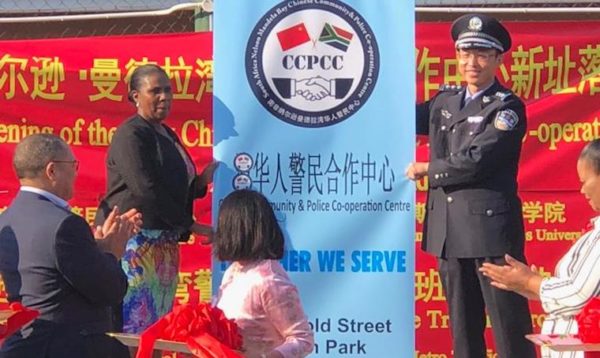Folks Concerned After China Opens 13th Police Station in South Africa
The opening of the 13th Chinese Community and Police Co-Operation Center in South Africa last week has sparked concerns about China’s growing influence in various institutions across the continent of Africa.
On Oct. 28, several dignitaries gathered in Port Elizabeth to celebrate the opening of the new center, which was established to improve relation and communication between South African police and the local Chinese community, the Daily Dispatch reported. The 3rd Term opening of the Chinese Language Training Program, which teaches law enforcement officers to speak Mandarin, was also celebrated.
Lt. General Liziwe Ntshinga, who serves as the provincial commissioner, lauded the ongoing collaboration between the Chinese and South African communities.

“My confidence is also derived from the long term economic relations our country has with the Republic of China,” Ntshinga said in her remarks. “With the strengthened and deepened relationship between South Africa and China, the (South African Police Service) SAPS has benefited by finding its role in order to further the existing relationship within the police and the Chinese community.”
She continued: “This relationship has also found its expression in the educational programs involving our police members. I congratulate the Chinese community for the noble initiative established in the Province and Clusters in Port Elizabeth.”
Yu Yuan, the Councillor of the Embassy of the People’s Republic of China in Pretoria, also addressed the crowd and assured the Chinese would be law abiding “model citizens” while living in South Africa, many of whom are there for work. The embassy promised to support the local police and called on law enforcement officers and the Chinese to work together to build safer, more secure communities.
The Chinese have been occasional victims of crime in South Africa, according to the newspaper.
Furor over the new community center arose after Twitter celebrity Julius Malema authored a post suggesting the Chinese were taking over by opening their own police stations.
“Now Chinese are opening their own police stations in South Africa,” Malema tweeted. “They have already opened 13 & this one was opened yesterday in PE.”
Jie Lee Zhang, CEO of the CCPCC, denied this however, saying the office will serve as the “middleman” between South African government police departments and Chinese citizens living in South Africa.
Various countries across the Motherland have welcomed China’s growing presence in the continent with open arms. However, some African natives have expressed worry over the Asian nation being allowed to enter certain social and cultural spaces within the diaspora. Racist attitudes have also become cause for concern.
Just last month, a Chinese worker was deported from Kenya after he was caught on video making disparaging remarks and likening Kenyan citizens to “monkeys.” In the video, Liu Jiaq, who expanded his motorcycle company to Africa, is heard complaining about how he hates Kenya, saying it “smells bad and (its people are) poor, foolish and broke.”
“They [the Chinese] are the ones with the capital, but as much as we want their money, we don’t want them to treat us like we are not human in our own country,” David Kinyua, who manages an industrial park in Ruiru that is now home to several Chinese companies, told The New York Times earlier this month.
Meanwhile in Djbouti, China has built its own military base. In Zambia, the police force welcomed new Chinese reservists last year and the state-owned newspaper, “Times of Zambia,” ran an article in Mandarin, according to This Is Africa.
With China’s growing investment in Africa, which more than doubled between 2011 to 2015 from $16 billion to $35 billion, many have been left to question how African countries stand to benefit and how do they’ll go about protecting the interests of its people.
No comments:
Post a Comment
Comments always welcome!